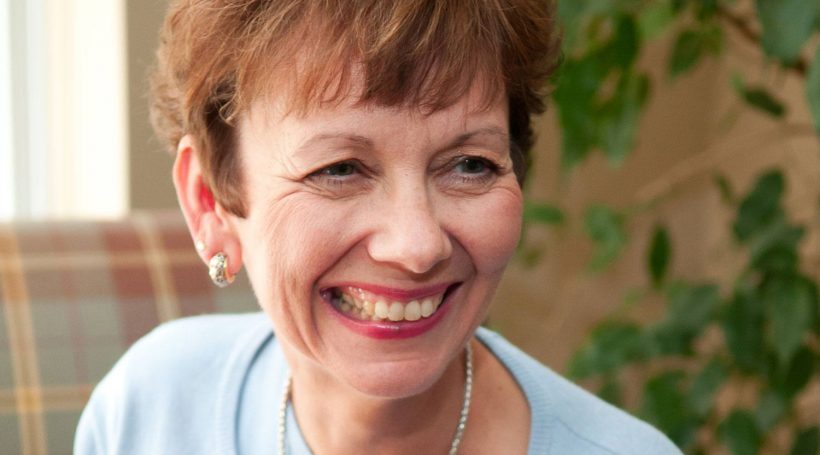Westampton’s Paula Hughes has been a nurse for 20 years, working for Samaritan Hospice and Healthcare for almost five years. Hughes’ job is to work with patients who are dying – maybe soon, maybe in a few months. But when she enters a home, everyone she will meet knows the person they love is about to die. We talked with her about what that’s like, and what she thinks about the work she does.
What’s it like to go into a home where a loved one needs hospice care?
Every family is different. My main goal is to let the families know what we can do for them, that were available 24 hours a day, and they’re not going through this alone. Doctors tell families it’s time to call hospice because there is nothing more they can do, and it’s very frightening for families. I try to let them know we’re going to walk through this with them. I’ll ask the families to tell me their goals. What do they expect from us? What do they want from all of this? We’ll do anything we can to help them reach their goals.
Are there times when family members are so distraught they can’t communicate with you?
I try to meet families where they are. You have to keep the lines of communication open and go back multiple times if needed. Some families are in complete denial, and that’s okay. We’ll take baby steps, hold their hand and be there with them. You can’t go in thinking you know everything, you just really want to present things a little bit at a time.
A lot of families might have problems with giving their loved one morphine. Morphine sort of has that stigma, and so we educate. We explain that morphine is a wonderful drug that can be used to help make your loved one comfortable in a hospice situation. It’s used for pain, it’s used for shortness of breath. We need to be constantly educating the family.
Have you ever gone into a home where you met a family that didn’t get along?
Oh yes, and that can be hard. We try to have one point-person, because we can’t be calling 20 family members. Sometimes we call a family meeting and say, “We all want to do what’s best for your loved one. What can we do to achieve this?” There’s family issues that went on long before we came into the picture, so we’re not going to be able to resolve all that, but we try to have peace in the home where the patient is actively dying. That’s what we really want to do.
In a good-case scenario, the patient will have a living will, where the patient explained when he was healthy what his needs and wants were. We can refer back to that and say, “This is what your mom or dad wanted. They didn’t want to be intubated, they didn’t want IV fluids.” It’s very individual. Sometimes we have to pull out that paper work, so we can all honor the patient’s wishes.
Can you tell us about a patient who made an impression on you?
 Oh, I’ve had many. I have a patient who spent a lot of his life playing the organ. When I went to visit him last week, I called ahead, as I always do, to let him know I was coming. He said to come right in when I got to the door. When I walked in, he was in the living room, where he performed a little concert for me. He played on his organ for about 25 minutes. God bless him, he had his oxygen going and everything. He said, “Paula I don’t want to take up too much of your time, but I’ve wanted to do that for you, and I’ve been waiting for a good day.” I told him he made my week.
Oh, I’ve had many. I have a patient who spent a lot of his life playing the organ. When I went to visit him last week, I called ahead, as I always do, to let him know I was coming. He said to come right in when I got to the door. When I walked in, he was in the living room, where he performed a little concert for me. He played on his organ for about 25 minutes. God bless him, he had his oxygen going and everything. He said, “Paula I don’t want to take up too much of your time, but I’ve wanted to do that for you, and I’ve been waiting for a good day.” I told him he made my week.
There are so many families that touch your heart. I had a patient that was a retired nurse, and we had a special bond. I said to her, “You know, us nurses always have to take care of each other.” She understood what was going on. It was a beautiful experience, helping her through her end of life.
Is it difficult to do your job?
It’s hard some days. You are going to get attached, but that’s okay. You have to know your boundaries. When your day is over, you have to turn off your phone and trust that your colleagues will take care of everything until you come back the next day. I think it’s important to be able to recharge your batteries. You have to take care of yourself so you don’t burn out.
Do you fear death?
I don’t think so. I want somebody to make sure I am comfortable. That’s the only thing I fear. I don’t want to be in pain, I don’t want to be struggling. But the actual dying, no. I have seen — and this might sound a little odd — but I have seen some beautiful deaths, when the patient was at peace and surrounded by all their family. It’s a privilege and an honor to be there at that moment.
You said you’ve seen some beautiful deaths. What is a death that’s not beautiful?
Sometimes the person is really fighting and is severely agitated. You can tell they’re not at peace about what’s going on, and that’s hard. We do have medication to help, but you can tell, especially if you’ve had the privilege of being with the patient for a little while. Sometimes somebody says, “I’m not okay with what’s going on,” and they fight it every step of the way. It’s hard to see that.
At your workplace, there’s sadness. How does that not make you a sad person?
I feel I’m making a difference. How would they be able to go through this if they didn’t have a hospice member to help them? It’s a joy to be able to help someone through this journey. Once in a while I do cry with the patient or the family. It’s okay to show your human side. If you don’t have emotion, I don’t think you’d be a very good nurse. I don’t think there’s anything wrong with holding a patient’s hand and crying with them. You know, its okay.
What would you tell people who fear death?
I guess I would tell them that I understood how they feel but unfortunately, it’s something that’s going to happen to all of us. We’re all going to die one day. I think how we approach life, lots of times, is how we approach death. If one of my friends was diagnosed with a terminal disease and couldn’t accept it, I would tell them to surround themselves with friends and family because nobody should go through this alone. Maybe some help from family and friends would help that person get to a level of acceptance.
Do you recognize the good you bring to people?
Yes, yes. When a beautiful card or note is sent to Samaritan, it means so much. It’s like, “Wow.” I’m not able to go to everybody’s funeral, but once in a while I’ll go and — oh my gosh — the families will tell me they couldn’t have gone through this without me, and they thank me. That makes everything so worthwhile. I have a stack of cards that I’ve saved over the years, and if I’m having a bad day, I go home and read a few of those cards. It reinforces why I do what I do. It’s truly an honor to do this kind of work.














